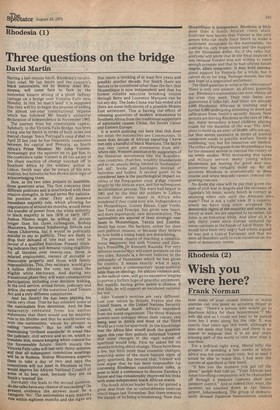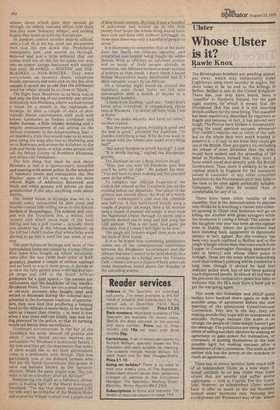Rhodesia (2)
Wish you were here?
Frank Norman
How many of your closest friends or worst enemies can you point an accusing finger at and say: "There's a person who would go to Southern Africa for their honeymoon,"? My wife did and as I could not bear to be parted from her I went along for the ride. It was exactly four years ago this week, although it does not seem that long ago and there is no reason to suppose that it is an any more relaxing part of the world to visit now than it was then.
For a political right wing, liberal lefty the prospect of spending a few weeks in white Africa was not particularly cosy, but at least I would be able to boast that I had seen the horrors of apartheid at first hand.
"It hits you the moment you get off the plane," people had told us. "Your African and Asian travelling companions will be channelled off through a separate customs shed and passport control." And so indeed they were, the moment we touched down at Jan Smuts airport, Johannesburg. The group of immaculately dressed Japanese businessmen seemed unsure about which gate they should go through. An elderly customs officer told them that they were 'honorary whites,' and smiling hugely they lined up with the Europeans.
At passport control another elderly official, with a Colt 45 at his hip, eyed our documents then cast his eye down the `Prohibited Immigrants List' and waved us through. Relieved and just a little irritated that our names were not on the list we made our way into an airport lounge festooned with notices that read: `BLANKES — WHITES' and `NIEBLANKES — NON-WHITES'. They were everywhere: on lavatory doors, telephone kiosks, entrances and exits and on the bus stop outside. It struck me as odd that the Afrikaans word for 'white' should be so close to `black.'
The flight from Heathrow to Jo'burg was in • fact only the first leg of our journey; our actual destination was Rhodesia, where we had rented a house for a month in the highlands of Inyanga. So after a couple of days of ,strenuously liberal conversation with such \well known luminaries as Nadine Gordimer \ and Helen Suzman, a little whisky drinking and a lengthy announcement of our arrival on the African continent in the Johannesburg Star — we boarded a train that would take us at snails' pace along the long slim line to Mafeking and on to Bostwana and across the Kalahari to the lush and fertile lands of what some people still call the British Colony of Northern Rhodesia, and others call Zimbabwe.
The first thing that must be said about Rhodesia is that it is spectacularly beautiful and teaming with secret police. In the windows of Salisbury hotels and restaurants the Vie Blankes' signs of SA give way to the more refined 'Right of Admission Reserved' and black and white grasses will inform on their grandmother if she says anything rude about Smithy.
Our timber house in lnyanga was set in a remote valley surrounded by pine trees and heather-coated hills rolling away to the distant borders of Mozambique. The nearest and only pub was the Troutbeck Inn, a whites only country club which owns most of the local fishing and has a golf course — actually there was another bar in the African settlement up the hill but I didn't realise that white folks were allowed to go into it until the last week of our stay.
The pine forests of Inyanga and most of the surrounding farms are owned by Flying Officer Kite types who bought up whole mountainsides after the war (with their army or RAF gratuity), planted a couple of million saplings and sat back to watch them grow. A decade or so later the fully grown trees were hacked into pit props and sold to the South African goldmines for a quid apiece — the owners are millionaires and the backbone of Ian Smith's Rhodesian Front. There are too a small number of old-style pioneers who bought land and settled in Rhodesia during the colonial days; schooled in the European tradition of paternalism, they now find that proffering a helping hand to the African is more.likely to be looked upon as treason than charity — at least it was when I was there and one kindly lady had her dog poisoned by the police, so that its barking would not betray their surveillance.
Overheard conversations in the bar of the Troutbeck Inn rarely strayed off politics and while I never heard anyone express any enthusiasm for Rhodesia's multiracial future, 1 did now and then get the impression that many of them would like to see their government come to a settlement with Britain. This was particularly true of the diehard farmers who first put the Smith Government into power in what has become known as the 'lavatory election.' When the party slogan was: "Do you want to sit on a lavatory after an African?"
Reminiscing one night at a Salisbury dinner party, a leading light of the liberal movement remarked: "The day that Smith declared UD1 my wife and I sat in the bar of the Meikles Hotel and waited for Wilson to send over a plane-load of Bow Street runners. My God, if just a handful of policemen had turned up in . the first twenty-four hours the whole thing would have been over and done with without a struggle. In those days there was only a handful of people to arrest."
It is interesting to remember that in the early days the battle for African equality and integration was largely being fought by white liberals. With so efficient an informer system and so many of their people already in restriction, the Africans tended to steer as clear of politics as they could. I don't think I heard Bishop Muzorewa!s name mentioned and if I did it certainly wasn't by an African.
On a Saturday night booze-up around the Salisbury pubs (hotel bars) we fell into conversation with a bunch of blacks in a multiracial hostelry.
"1 come from Zambia," said one. "And I don't know what everybody is complaining about here in Rhodesia, I'm better off here than I am at home." "We are under se6rity and have no voice," another replied.
"But the money is good, housing is good and the beer is good," persisted the Zambian. "In Zambia everything is bad. Why do you want to be equal with the whites and make everything bad?"
"But surely freedom is worth having?" I said. "It is worth having," replied the Rhodesian gravely.
The Zambian let out a deep African laugh.
"Man, just you wait till Rhodesia gets free you'll be sorry all right." He gulped his beer. "You will have to start looking out for yourself same as the whites."
To complete our 'African Experience' we took in the cabaret at the Troutbeck Inn on the evening before our departure. The talent of the artistes was around about the level of a North Country workingmen's club and the clientele was half-cut. A slim hard-faced blonde sang a couple of popular old songs, then a fat woman sang a couple of popular old songs. A man took the Hammond Organ through its paces and a baritone decked out in soup and fish sang the UDI anthem: "This is my land. God gave me this land. And if I must I will fight to be free."
The tough old farmers wiped theireyes with the back of their hands.
It is to be hoped that something productive comes out of the constitutional conference between the Rhodesian Government and the African National Council to be held shortly in a railway carriage on a bridge over the Victoria Falls — there's always a chance if both sides can make themselves heard above the thunder of the cascading waters.



































 Previous page
Previous page